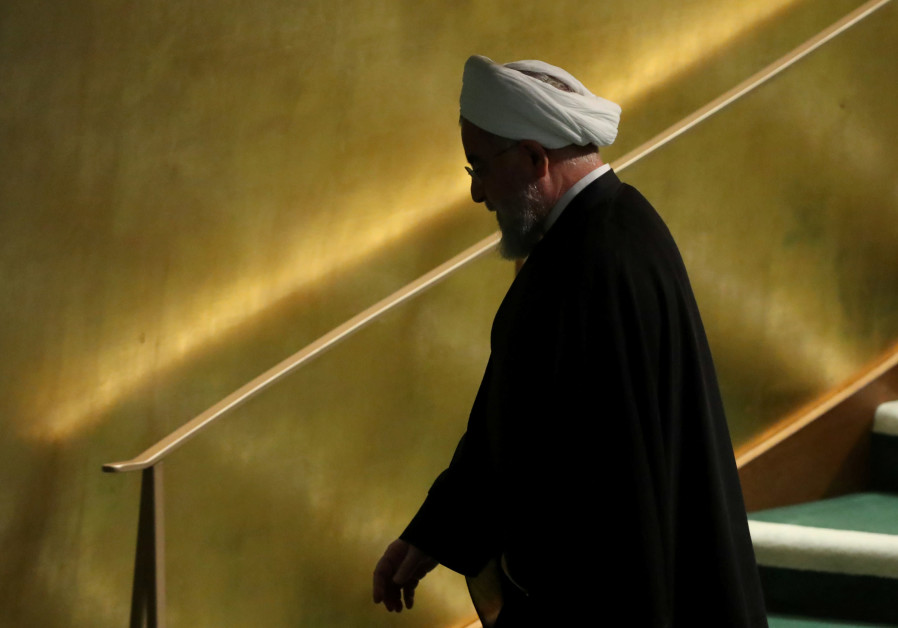Iran sanctions to snap back, with some exceptions

Iranian President Hassan Rouhani departs after speaking at the Nelson Mandela Peace Summit during the 73rd United Nations General Assembly in New York, September 24, 2018. (photo credit: CARLO ALLEGRI/REUTERS)
WASHINGTON – The Trump administration will reimpose harsh sanctions against Iran on Monday targeting its energy, shipping and financial industries, reverting to a policy of maximum pressure on the Islamic republic that was suspended under a 2015 international nuclear agreement.
Eight countries will receive sanctions waivers, however, including four of Iran’s top oil consumers: India, China, South Korea and Japan.
“We expect to issue some temporary allotments to eight jurisdictions, but only because they have demonstrated significant reductions in their crude oil [imports] and cooperation on many other fronts,” US Secretary of State Mike Pompeo told reporters. “These negotiations are still ongoing. Two of the jurisdictions will completely end imports as part of their agreements. The other six will import at greatly reduced levels.”
US President Donald Trump acknowledged the deadline over the weekend by tweeting an image inspired by HBO’s hit series, Game of Thrones. “Sanctions are coming,” the poster-like graphic read, “November 5.”
But the commander of Iran’s Islamic Revolutionary Guard Corps, Maj.-Gen. Qassem Soleimani, responded in kind with a similar image. His message read: “I will stand against you,” against a wintry backdrop.
Iran’s supreme leader, Ayatollah Ali Khamenei, lashed out at Trump on Sunday, stating that America’s standing had deteriorated to a nadir under his leadership. US officials say they expect that sort of rhetoric to continue from the Iranians as sanctions begin to bite.
Prime Minister Benjamin Netanyahu praised Trump for renewing the sanctions.
“For years I’ve called for fully renewing sanctions against Iran’s murderous terror regime that endangers the entire world,” Netanyahu said in a statement on Saturday. “The effect of the initial sanctions is already being felt: the [local currency] is at a low, Iran’s economy is at a low and we’re already seeing results on the ground. Thank you President Trump for this historic action. Sanctions are indeed coming.”
Opponents of the president’s strategy say that the bite will be felt not by Iran’s leadership, but by its people, who are already experiencing record unemployment and a debilitating currency crisis.
After Trump withdrew from the 2015 nuclear accord in May, his administration announced that sanctions previously lifted by the deal would return in two phases. This is the second phase; the first phase took effect on August 7.
But the administration says it is hardening even those pre-deal sanctions which, ostensibly, brought Iran into negotiations in the first place.
“These sanctions are far tougher than the sanctions that have ever been imposed on the Islamic Republic of Iran,” Pompeo said. “That is why they are so desperate to find ways to circumvent it.”
Among the new elements of the sanctions are additional designations of banks that have provided services to sanctioned entities.
US Treasury Secretary Steve Mnuchin said that SWIFT (Society for Worldwide Interbank Financial Telecommunication), the world’s largest provider for communications on financial transactions, may face exposure to sanction if it continues catering to designated Iranians.
“We have advised SWIFT that it must disconnect any Iranian financial institution that we designate as soon as technologically feasible to avoid sanctions exposure,” Mnuchin said. “Just as was done before, humanitarian transactions to non-designated entities will be allowed to use the SWIFT messaging system as they have done before, but banks must be very careful that these are not disguised transactions or they could be subject to certain sanctions.”
Iran hawks in Washington balked at the administration’s decision not to immediately sanction SWIFT and to grant a substantial number of waivers to Iran’s oil consumers. But Pompeo said those waivers are only valid for six months, and that the strategy was “part of an ongoing negotiation.”
No waiver was granted to the European Union, however, which is attempting to create a new financial mechanism that would undermine the US sanctions effort.
In a statement on Friday, France, Britain, Germany and the EU said that they “have committed to work on, inter alia, the preservation and maintenance of effective financial channels with Iran, and the continuation of Iran’s export of oil and gas.”
“On these, as on other topics, our work continues,” the bloc added.
The United States is able to pressure other nations to stop buying Iranian oil under a 2012 law that allows the president to cut off foreign banks, including central banks, from the US financial system unless they significantly reduce purchases.
Brian Hook, the US special representative for Iran, told reporters that the US believes global oil supplies will exceed demand next year, making it easier for countries to cut Iranian oil imports to zero.
The administration ultimately hopes to eliminate Iran’s oil exports in an effort to compel Tehran to “change its behavior.” In an interview last week, Pompeo said that he had seen no signs thus far that change was in the offing.
Oil prices fell on Friday for a weekly loss of more than 6%, as investors worried about crude oversupply after the US waivers. Brent crude futures fell six cents to settle at $72.83 a barrel, while US crude declined 55 cents to end the session at $63.14 per barrel, a 0.86% loss.
Reuters contributed to this report.
Join Jerusalem Post Premium Plus now for just $5 and upgrade your experience with an ads-free website and exclusive content. Click here>>






Comments are closed.